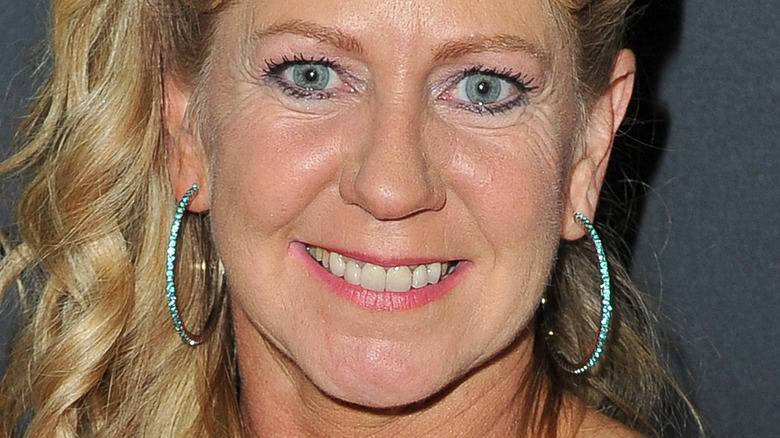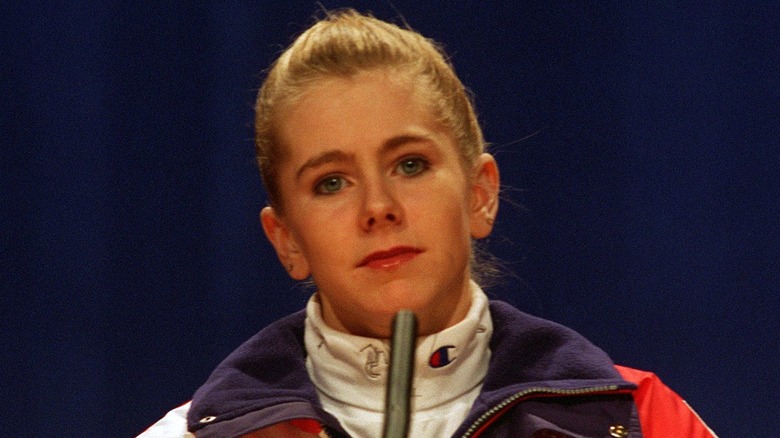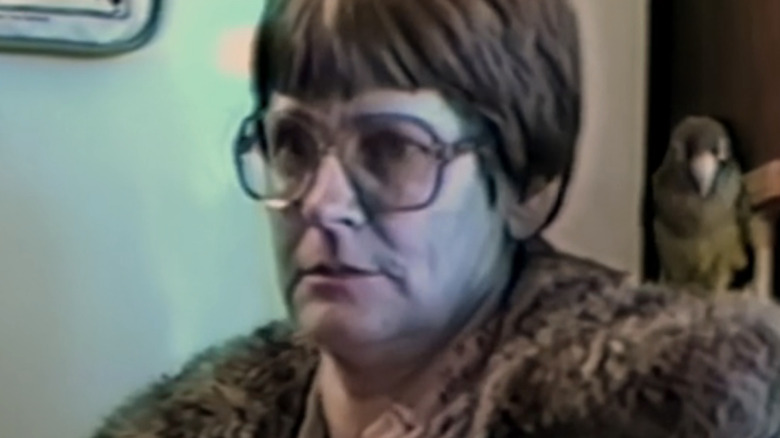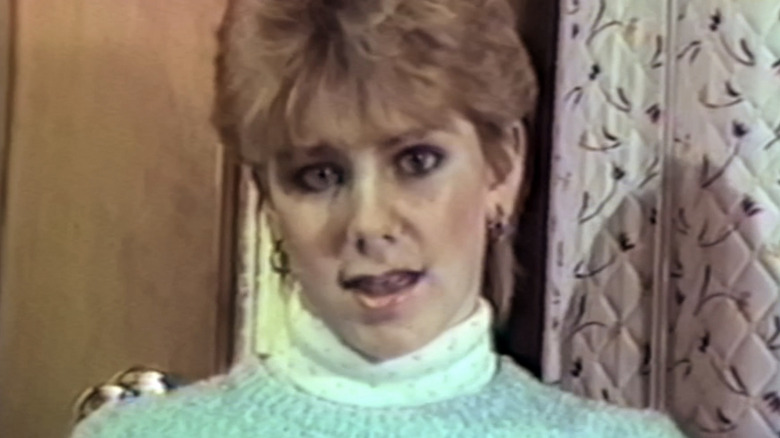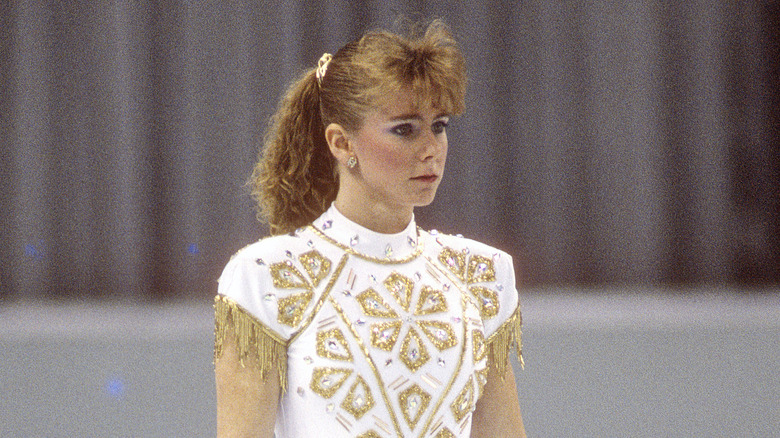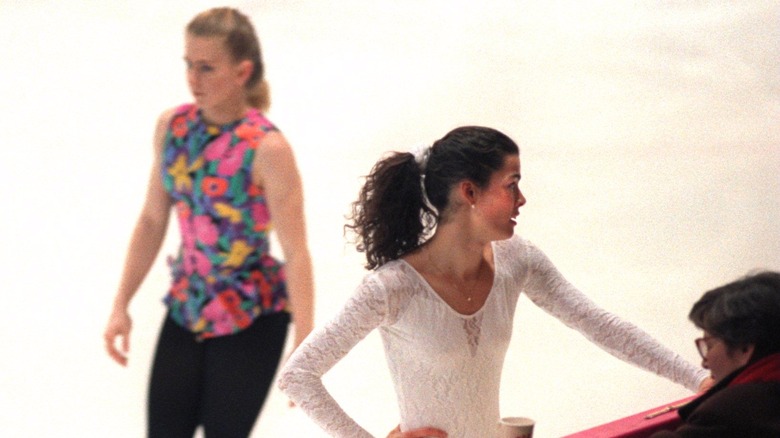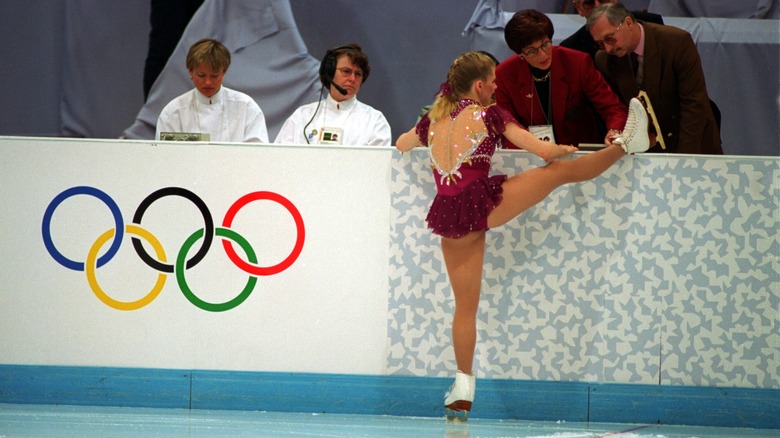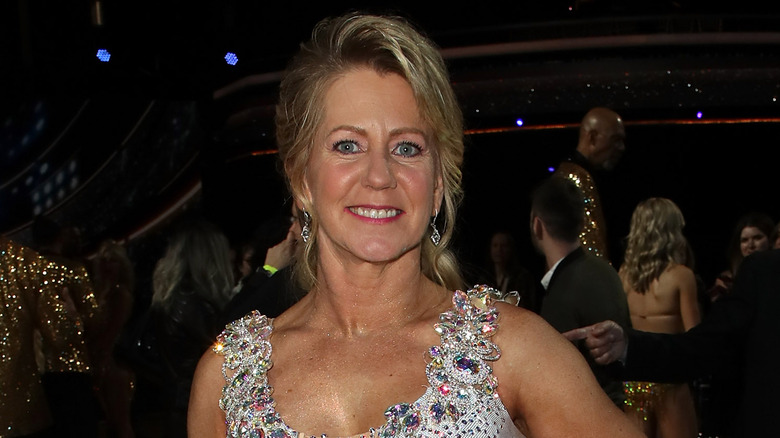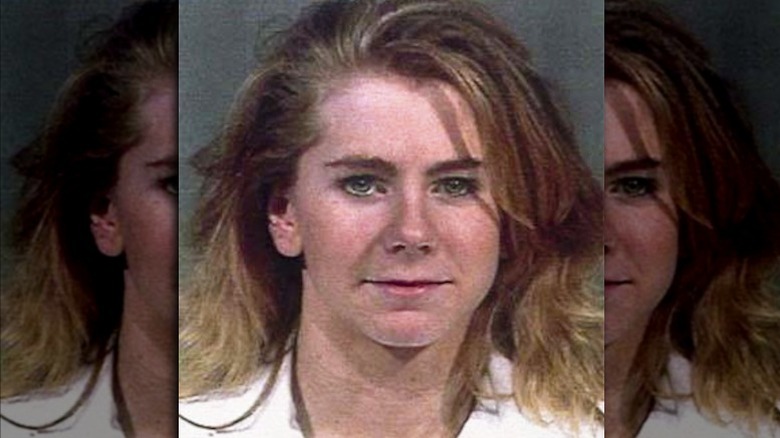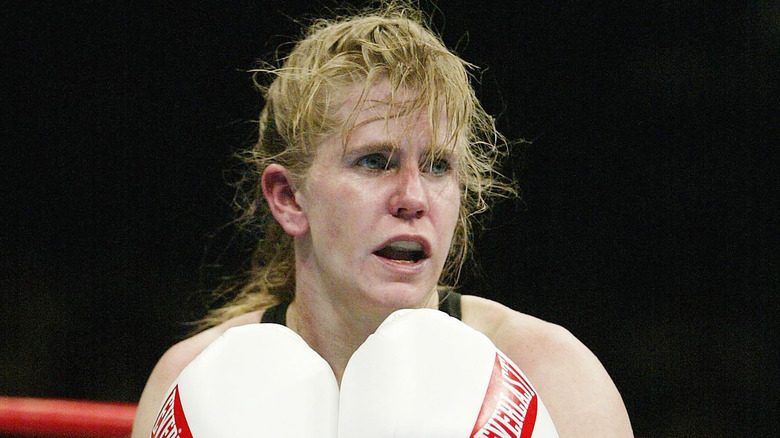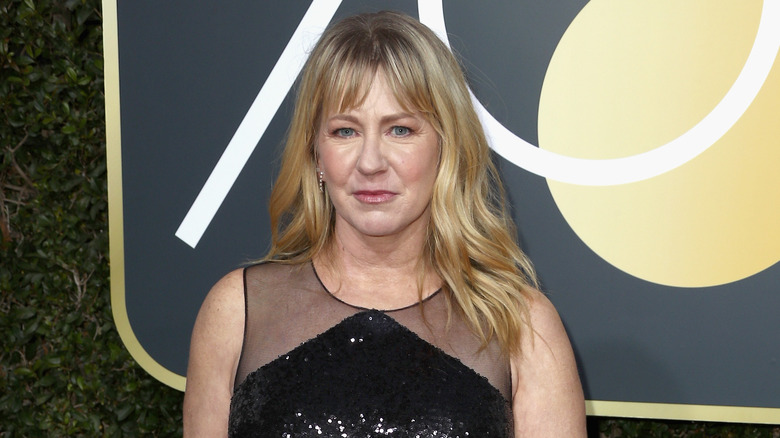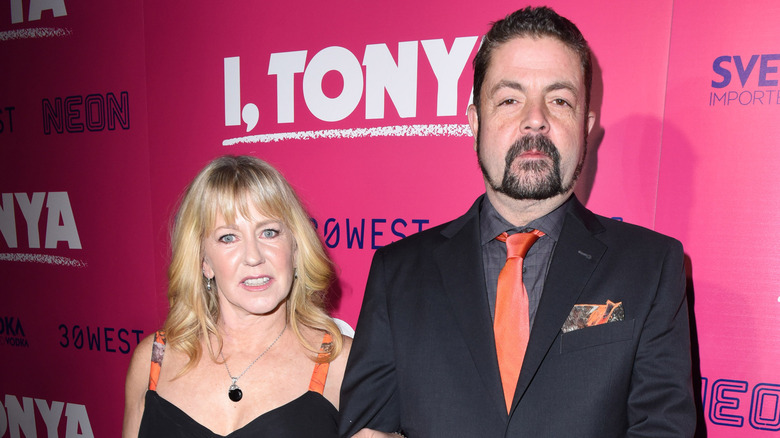Tragic Details About Tonya Harding
Tonya Harding is a pretty infamous athlete in pop culture, but the reasons, by now, have little to do with her achievements in the sport of figure skating — though she has many. Harding is a two-time Olympian, who became notable in her sport by taking home the women's singles title at the U.S. National Figure Skating Championships in 1991. To do so, she successfully executed a triple axel jump, making her "the first American woman" to ever achieve the feat "in competition," per ABC News.
Harding also won the national title in 1994, but was stripped of the win due to her connection to the 1994 assault of her competitor Nancy Kerrigan which rendered Kerrigan "unable to compete for the championship at the Olympic trials in Detroit" (per The Washington Post). Of course, the knee-bashing scandal is what helped Harding rise to pop culture infamy.
While most would agree that Harding's downfall is one of the saddest and most shocking in sports history, her unfortunate fate is not surprising when we consider some of the difficulties Harding faced in her life before the attack on Kerrigan. Harding's role in the crime only added to her hardship. We found many tragic details about Tonya Harding and the truth is she has had difficult circumstances to overcome both on and off the ice throughout her entire life.
Tonya Harding grew up in poverty
Figure skating is an expensive sport to pursue professionally. In 2018, Market Watch reported that it costs "between $10,000 to $20,000, if not more," for an Olympic hopeful skater to compete. No matter what the equivalent cost was in the late '80s and early '90s when Tonya Harding started competing at that level, her family couldn't afford it. She grew up in Portland, Oregon, in poverty. Her longtime coach, Diane Schatz-Rawlinson, explained Tonya's situation rather bluntly in the 1986 documentary film "Sharp Edges." "Skating, for Tonya, is her ticket out of the gutter," she said. "[She lives] in a terrible rental house, no supervision at all, she has no direction, there's not much to do."
Schatz-Rawlinson also claimed she paid for much of Harding's expenses and largely relied on people donating their time or discounting their products to get Harding skates, ice time, costumes, and choreography for her programs. Sometimes, Harding's mother, LaVona "Sandi" Golden, would make her costumes that had "sequins everywhere so that her thighs got cut up" per The New York Times. Sports reporter Ann Schatz explained the extent of Harding's poverty in the ESPN documentary "30 for 30: The Price of Gold." "[Tonya] skated a lot of times without food in her stomach. She skated not really [knowing] if that next lesson was going to come or not because she didn't know if she could pay for it." In other words: Figure skating was Harding's only path to a better life.
Tonya Harding's mother allegedly abused her
Tonya Harding's mother LaVona "Sandi" Golden (above) believed that her daughter needed negative reinforcement to succeed in her sport. "If there's no [one saying], 'You can't do it,' she won't do it," Golden said in the 1986 documentary film "Sharp Edges," adding that her daughter would "be nothing" without the challenge. In the same documentary, a then-15-year-old Harding alleged that Golden physically abused her, claiming, "She hits me and she beats me and she drinks."
Harding's friend Sandra Luckow, who filmed "Sharp Edges" as a thesis project for Yale University, told ABC News in 2018, "I saw [LaVona] hitting Tonya with a hairbrush. It was very upsetting to me. I never saw anything more than that." But Harding alleged, "I don't think that there was more than one day a week, sometimes, that I didn't get beat." Luckow claimed that she wanted to "go to child protective services," but was told that if she did it would "ruin [Tonya's] skating career" if "Tonya was taken away from her parents."
Harding also alleged that her mother once threw a steak knife at her from 10 feet away and it hit her arm. Harding called her mother "crazy." Golden denied the steak knife claim. "There just was never anything good enough for her," said Harding in the ESPN documentary "30 for 30: The Price of Gold." "She said I would never amount to anything, that I was fat, that I was ugly."
If you or someone you know may be the victim of child abuse, please contact the Childhelp National Child Abuse Hotline at 1-800-4-A-Child (1-800-422-4453) or contact their live chat services.
Tonya Harding was sexually assaulted
Tonya Harding's mother wasn't the only person who allegedly abused her. In Lynda Prouse's biography, "The Tonya Tapes," and in a later interview with The University of Oregan School of Law, Harding claimed her half brother, Chris Davison, molested her repeatedly, starting when she was five years old. Later, when Harding was 15 years old and Davison was 26, he allegedly tried to sexually assault her once more, reported Sports Illustrated in 1992. Harding was getting ready "for her first date" with future husband Jeff Gillooly when Davison allegedly came home drunk and "tried to kiss her." To escape, Harding claimed she burned him with her curling iron, locked herself in her bathroom, hit him with a hockey stick, called the police, and ran to a neighbor's house. Davidson was arrested and jailed, but Harding's mother downplayed the incident as a figment of Harding's "vivid imagination."
Gillooly used a similar denial after Harding accused him and two other men of raping her at gunpoint. She also claimed "a friend" previously raped her during a time when she was separated from Gillooly. Harding said she didn't go to authorities, because Gillooly threatened her, and she was also fearful of damaging her career, since at the time she was a "national champion."
In one of his only on-the-record interviews, Gillooly shrugged off Harding's rape accusation, telling Deadspin, "I forgot about that. I think I kind of laughed about it. ... It's a big story, and obviously her accusations didn't carry much weight with any type of authority."
If you or anyone you know has been a victim of sexual assault, help is available. Visit the Rape, Abuse & Incest National Network website or contact RAINN's National Helpline at 1-800-656-HOPE (4673).
Ex-husband Jeff Gillooly allegedly physically abused Tonya Harding, too
Tonya Harding suffered alleged physical abuse at the hands of her ex, too. She married her first boyfriend, Jeff Gillooly, in 1990 to escape her unstable home life, but claims Gillooly soon started to abuse her. In ESPN's film "30 for 30: The Price of Gold," Harding said that because of her experiences with her mother, she became conditioned to believe that someone could hit her and love her simultaneously.
The former Olympian described one of her first memories of Gillooly hitting her forABC News. She said he told her 7-11 nachos "would make [her] fat" and then smacked them out of her hand and allegedly hit her across the face. "I mean I've known that I'm 'stupid, b**ch, ugly, fat, never amount to anything' for my whole entire life," Harding said of how alleged perpetual abuse affected her. "Why do people not think that I would want to fight that, be better than that?"
In Lynda Prouse's biography, "The Tonya Tapes," Harding claims Gillooly slammed her hand in a car door when she was trying to flee their home during a fight. He also allegedly accidentally fired a gun at her during an argument in a parking lot, causing a piece of concrete to hit Harding in the face. The same Deadspin piece, in which Jeff Stone (née Gillooly) denied raping Harding, noted that "Harding filed a restraining order against him, though she would later tell the FBI he had never abused her."
If you or someone you know is dealing with domestic abuse, you can call the National Domestic Violence Hotline at 1−800−799−7233. You can also find more information, resources, and support at their website.
Tonya Harding is a convicted felon
On January 6, 1994, Tonya Harding's biggest figure skating rival, Nancy Kerrigan, was struck in her right knee (her landing knee) with a baton after practicing for the U.S.. National Championships at the Cobo Arena in Detroit, Michigan (via Bleacher Report). She had to withdraw from the competition, which Harding won. By January 12, Sean Eckardt, Harding's "bodyguard" confessed his part of the crime to the FBI and laid out the plan that also involved his friends — hitman Shane Stant (who attacked Kerrigan) and Derek Smith. He also implicated Jeff Gillooly and Harding (via ABC News).
Smith, Eckhardt, and Stant were eventually charged with conspiracy to commit second-degree assault (per ABC News). Gillooly pleaded guilty to racketeering. By January 27, Harding held a press conference addressing her involvement in the incident. "I had no prior knowledge of the planned assault on Nancy Kerrigan," she said, in-part (via "30 For 30: The Price of Gold"). "I am responsible, however, for failing to report things I learned about the assault when I returned home from Nationals." Harding eventually pleaded guilty to hindering the prosecution, which is a felony charge, as The New York Times reported. She was sentenced to supervised probation that lasted three years, and ordered to set up a fund benefiting the Special Olympics. Harding was allowed to participate in the Olympics after suing The U.S. Olympic Committee to prevent them from holding a hearing to discuss her fate, per Bleacher Report.
The broken skate lace that ruined Tonya Harding's Olympic dreams
Before Tonya Harding was convicted for hindering the prosecution in the quest to find Nancy Kerrigan's attacker, she was able to participate in the 1994 Olympics in Lillehammer, Norway, because she pursued legal action to ensure she stayed on the team (per Bleacher Report). But Harding still had to skate well in order to win the gold medal she wanted, a task she did not achieve.
Harding was in 10th place after the technical "short" program (via ESPN's "30 For 30: The Price of Gold") when disaster struck in the longer free skate final program two days later. She was late to appear on the ice and then stopped her program after failing to complete her first jump, claiming to officials that the laces on her right skate broke. Harding was granted the opportunity to redo her program later, but finished in 8th place overall.
Audrey Williams, an Olympic figure skating judge in 1994, told Good Housekeeping in 2017 that she had seen Harding allege a problem with her skates before. At a Skate America event in Dallas, Harding claimed her "blade was loose," said Williams, who was the referee at the event. "I didn't feel any weakness on the blade." As for the Olympics incident, Williams said, "I just couldn't believe that she would do it. And I didn't believe that her lace was broken. I can't honestly say, I never saw it."
Tonya Harding was banned from the U.S. Figure Skating Association for life
After the Olympics, Tonya Harding was banned from the U.S. Figure Skating Association (USFSA) for life, per The New York Times. This might not seem like a big deal for a 2-time Olympian who had already been at the center of so much controversy in the sport. But as The New York Times explained, the ban effectively prevents her from making a living through the sport she loves in any way, because it even owns professional exhibition shows like "Stars on Ice." Plus, Harding is banned as a skater and a coach, so she could never teach a young skater who was serious about the sport because "she wouldn't be allowed to bring them to competition."
Harding has since "worked as a welder, a painter at a metal fabrication company, a hardware sales clerk at Sears." The New York Times reported that Harding only received $1,500 up front for optioning the rights to her life story to "I, Tonya" screenwriter Steven Rogers (it's unclear how much more she made after the film's success).
As of this writing, Harding lives in Washington where she is raising a son with her husband, Joe Price. The couple enjoys woodworking and hunting; Harding can't own a gun because she's a convicted felon, so she uses a bow and arrow. She also occasionally does random jobs in Hollywood, and made it to the finale of "Dancing with the Stars" Season 26.
Tonya Harding's troubles with the law continued after her figure skating career
Tonya Harding's trouble with the law didn't end with her involvement in the assault on Nancy Kerrigan. Per the Los Angeles Times, she was arrested for "fourth-degree domestic violence assault" in 2000 for allegedly "throwing a hubcap" at her then-boyfriend, Darren Silver, as well as "repeatedly punching him in the face." According to the police report, Silver stated that Harding was "hooking me like Mike Tyson." Police also stated that Silver's face was "bruised and bloodied" after the alleged altercation. Harding was released from police custody shortly after her arrest.
Nearly two decades later, Harding spoke with the Oregon University School of Law about how domestic violence has influenced her life. While she did not specifically address any of her exes, she did say, "I dated many men and each one of them was abusive." When asked to explain instances in which she appeared to have been "violent or even the aggressor," Harding explained that she only uses physical violence as a defense. "If people call me the aggressor — it is because I said, 'No, I am not going to take it anymore!' ... So, I hit back. These men are like 6' and I am like 5'1", but yet I am the aggressor. No. I am fighting back. And because someone fights back does not mean that they are the aggressor. It means that they finally had enough."
If you or someone you know is dealing with domestic abuse, you can call the National Domestic Violence Hotline at 1−800−799−7233. You can also find more information, resources, and support at their website.
Tonya Harding's attempt at a boxing career failed
After being banned from the United States Figure Skating Association (USFSA) for life, Tonya Harding had to figure out a new way to make a living. Boxing may not seem like the obvious choice for a disgraced figure skater, but Harding got a taste of it in 2002 when she appeared in a celebrity boxing match against Paula Jones, a woman who accused Bill Clinton of sexual assault.
After the celebrity match, Harding began training as a professional boxer, working with Portland-based boxing manager Paul Brown, and earning as much as $15,000 per fight, The Washington Post reported. She fought fellow novice Samantha Browning in her first match and the latter won in a split decision. Harding won her next three matches in a row and was working with famed boxing promoter Tony Holden by that time. But he told ESPN, "Tonya started [boxing] way too late and was very limited." In the ring, Harding had more grit than skill. "Her skills and defense lacked. It was more of a media attraction than a pure boxing show," Holden said.
Although Harding intended to stick with the sport until she earned just enough for the modest goal of "having enough money to go hunting and fishing and go to the big four-wheel-drive mud bogs" (per WaPo), she quit after just six professional bouts, losing her last by TKO to Amy Johnson. Harding's final record was 3-3.
Tonya Harding has attempted suicide
Tonya Harding told The New York Times that even after fulfilling the terms of her plea deal and being banned from the sport she loves for life for her part in the attack on Nancy Kerrigan, she still faces ridicule from the public more than two decades later. "I've had rats thrown into my mailboxes, [expletive] left on my door, left in my mailbox, all over my trucks. You name it, it's been done to me."
Despite her tough persona, Harding is a human being and constant judgment from the public would wear on most anyone. "I had my house ransacked. I had my truck stolen and dropped off of a cliff and burned. I've been stalked, restrained and beaten," she revealed to the University of Oregon School Of Law. In the same interview, she was candid about her suicide attempt, saying, "A higher power took over and I was able to pull myself together. From that day on, I realized that life is too precious to throw away. ... It's been a long journey since that day and it wasn't until I was 38 years old when I finally realized that I am worth something."
If you or someone you know is having suicidal thoughts, please call the National Suicide Prevention Lifeline at 1-800-273-TALK (8255) or text HOME to the Crisis Text Line at 741741.
Tonya Harding's biggest fan died
Tonya Harding had contentious relationships with many family members throughout her life, but has always said that her dad was her biggest fan. Albert "Al" Gordon Harding died in 2009. He was 76 years old. "One of his greatest joys in life was watching his daughter, Tonya, ice skate. He was always so proud of her," his obituary read.
Tonya described her dad as "an excellent man and father" to University of Oregon School Of Law. "[He] came to all my competitions when he could. We talked everyday – he never abandoned me. My dad was there for me the best that he could be. He was there when I needed a shoulder to cry on."
Per The New York Times, Tonya loves hunting because it's something she used to do with Al. Tonya gave birth to a son with her husband, Joe Price (pictured above), in 2011, just two years after her father's death. His name is Gordon. The child is presumably named after her beloved father.

